Stories
The Highwayman
by Alfred Noyes
Part One
The wind was a torrent of darkness among the gusty trees, The moon was a
ghostly galleon tossed upon cloudy seas, The road was a ribbon of
moonlight over the purple moor, And the highwayman came riding—
Riding—riding—
The highwayman came riding, up to the old inn-door.
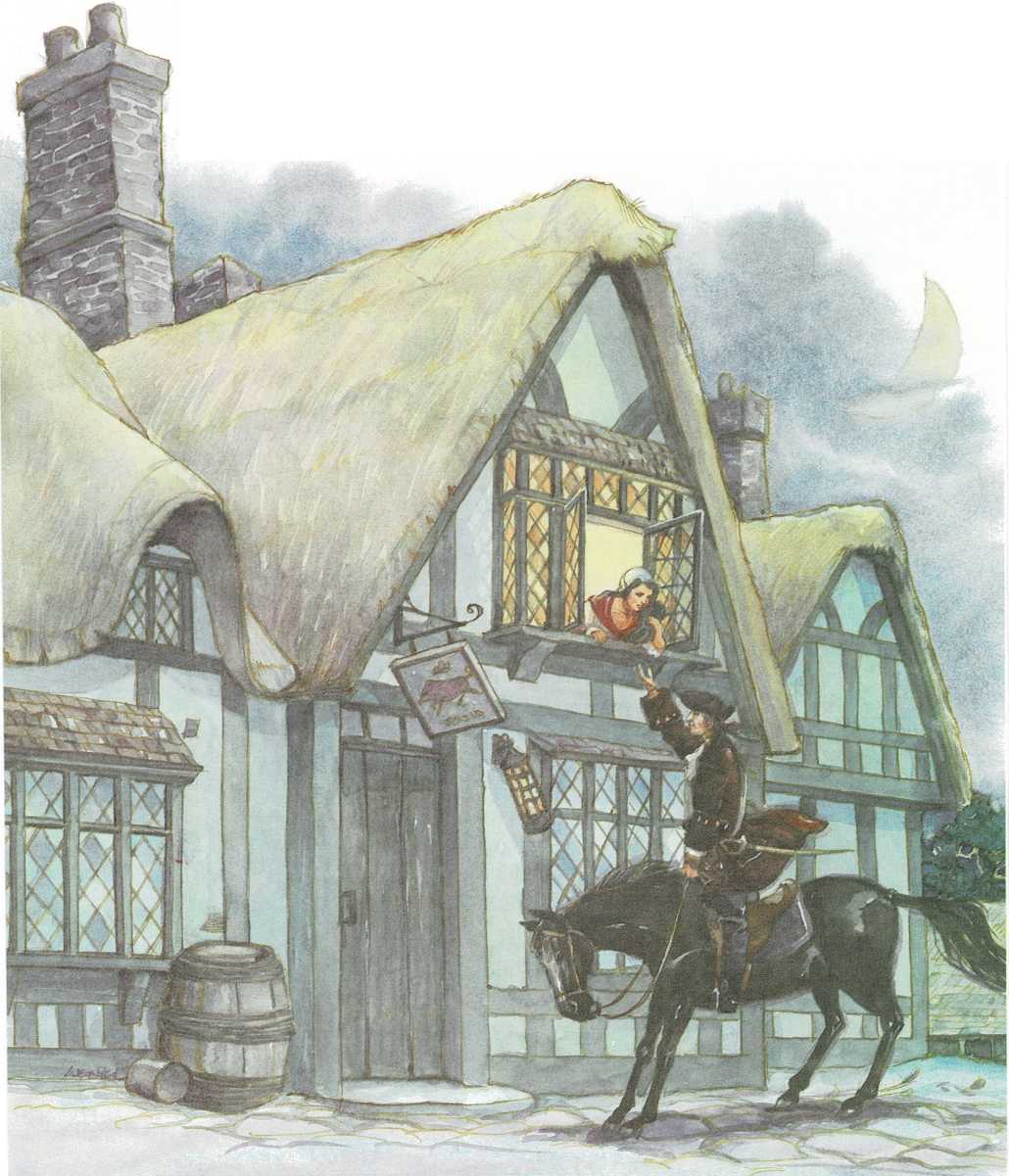
He’d a French cocked-hat on his forehead, a bunch of lace at his chin, A
coat of the claret velvet, and breeches of brown doeskin: They fitted
with never a wrinkle; his boots were up to the thigh!
And he rode with a jewelled twinkle,
His pistol butts a-twinkle,
His rapier hilt a-twinkle, under the jewelled sky.
Over the cobbles he clattered and clashed in the dark inn-yard,
And he tapped with his whip on the shutters, but all was locked and
barred: He whistled a tune to the window, and who should be waiting
there But the landlord’s black-eyed daughter,
Bess, the landlord’s daughter,
Plaiting a dark red love-knot into her long black hair.
And dark in the dark old inn-yard a stable-wicket creaked Where Tim, the
ostler, listened; his face was white and peaked, His eyes were hollows
of madness, his hair like moldy hay;
But he loved the landlord’s daughter,
The landlord’s red-lipped daughter:
Dumb as a dog he listened, and he heard the robber say— “One kiss, my
bonny sweetheart, I’m after a prize tonight, But I shall be back with
the yellow gold before the morning light. Yet if they press me sharply,
and harry me through the day, Then look for me by moonlight,
Watch for me by moonlight:
I’ll come to thee by moonlight, though Hell should bar the way.”
He rose upright in the stirrups, he scarce could reach her hand;
But she loosened her hair i’ the casement! His face burnt like a brand
As the black cascade of perfume came tumbling over his breast;
And he kissed its waves in the moonlight,
(Oh, sweet black waves in the moonlight)
Then he tugged at his reins in the moonlight, and galloped away to the
West.
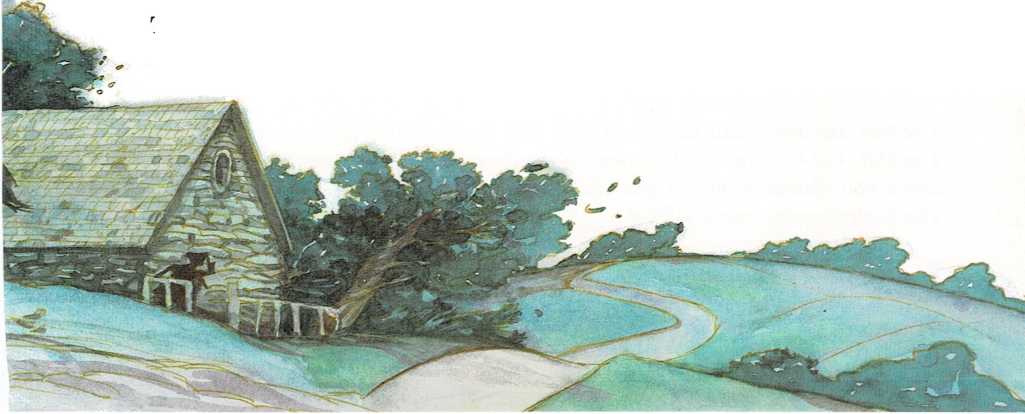
Part Two
He did not come in the dawning; he did not come at noon;
And out of the tawny sunset, before the rise o’ the moon,
When the road was a gypsy’s ribbon, looping the purple moor,
A red-coat troop came marching—
Marching—marching—
King George’s men came marching, up to the old inn-door.
They said no word to the landlord, they drank his ale instead;
But they gagged his daughter and bound her to the foot of her narrow
bed.
Two of them knelt at her casement, with muskets at the side!
There was death at every window;
And Hell at one dark window;
For Bess could see, through her casement, the road that he would ride.
They had tied her up to attention, with many a sniggering jest:
They had bound a musket beside her, with the barrel beneath her breast!
“Now keep good watch!” and they kissed her. She heard the dead man
say— Look for me by moonlight;
Watch for me by moonlight;
I\’ll come to thee by moonlight, though Hell should bar the way!
She twisted her hands behind her; but all the knots held good!
She writhed her hands till her fingers were wet with sweat or blood!
They stretched and strained in the darkness, and the hours crawled by
like years;
Till, now, on the stroke of midnight,
Cold, on the stroke of midnight,
The tip of one finger touched it! The trigger at least was hers!
The tip of one finger touched it; she strove no more for the rest!
Up, she stood up to attention, with the barrel beneath her breast, She
would not risk their hearing: she would not strive again;
For the road lay bare in the moonlight,
Blank and bare in the moonlight;
And the blood of her veins in the moonlight throbbed to her Love’s
refrain.
Tlot-tlot, tlot-tlot! Had they heard it? The horse-hoofs ringing
clear—
Tlot-tlot, tlot-tlot, in the distance? Were they deaf that they did
not hear?
Down the ribbon of moonlight, over the brow of the hill,
The highwayman came riding,
Riding, riding!
The red-coats looked to their priming! She stood up straight and still!
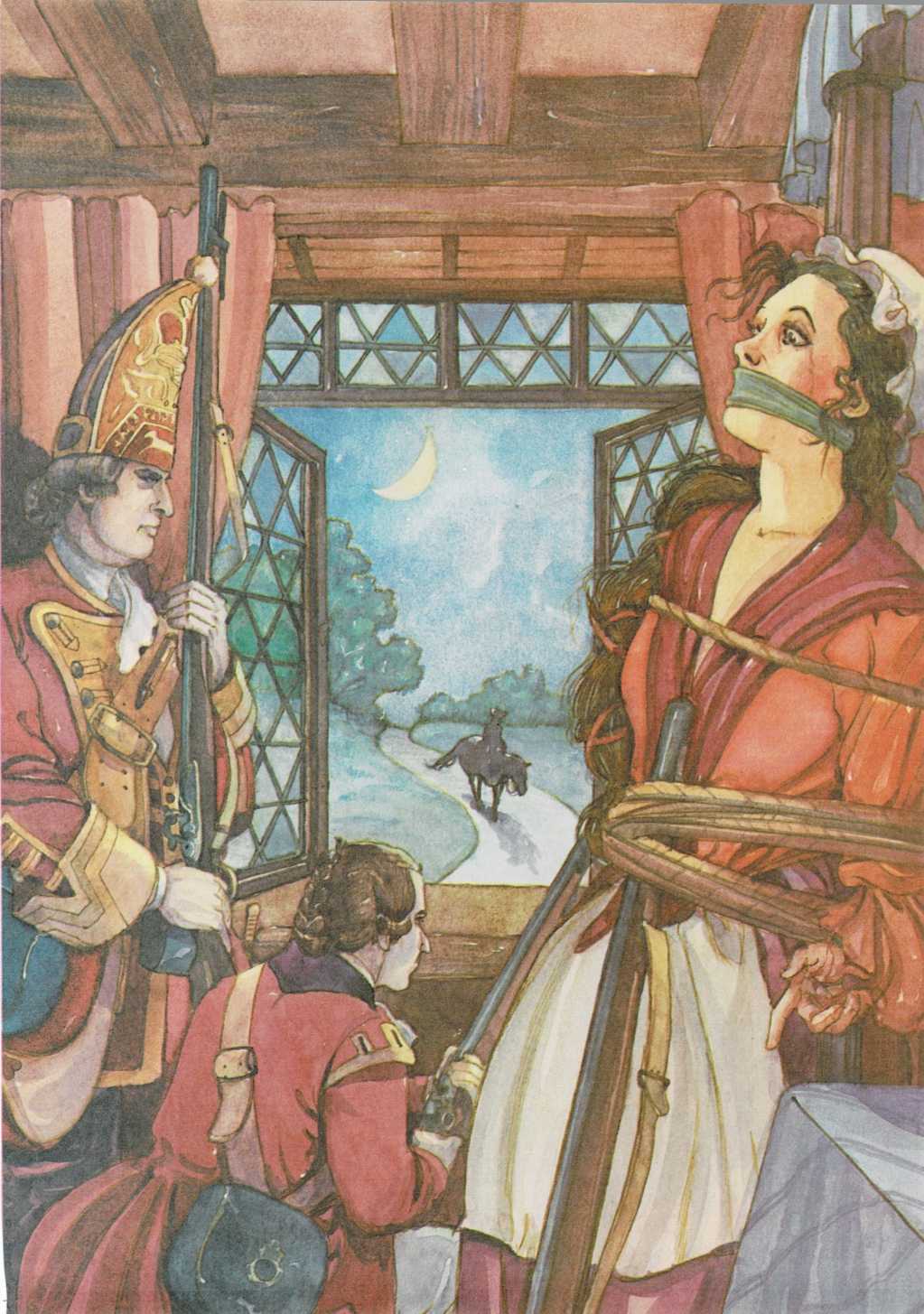
Tlot-tlot, in the frosty silence! Tlot-tlot in the echoing night!
Nearer he came and nearer! Her face was like a light!
Her eyes grew wide for a moment; she drew one last deep breath,
Then her finger moved in the moonlight,
Her musket shattered the moonlight,
Shattered her breast in the moonlight and warned him—with her death.
He turned; he spurred to the West; he did not know who stood
Bowed with her head o’er the musket, drenched with her own red blood!
Not till the dawn he heard it, and his face grew gray to hear
How Bess, the landlord’s daughter,
The landlord’s black-eyed daughter,
Had watched for her Love in the moonlight; and died in the darkness
there.
Back he spurred like a madman, shrieking a curse to the sky,
With the white road smoking behind him, and his rapier brandished high!
Blood-red were his spurs in the golden noon; wine-red was his velvet
coat;
When they shot him down on the highway,
Down like a dog on the highway,
And he lay in his blood on the highway, with the bunch of lace at his
throat.
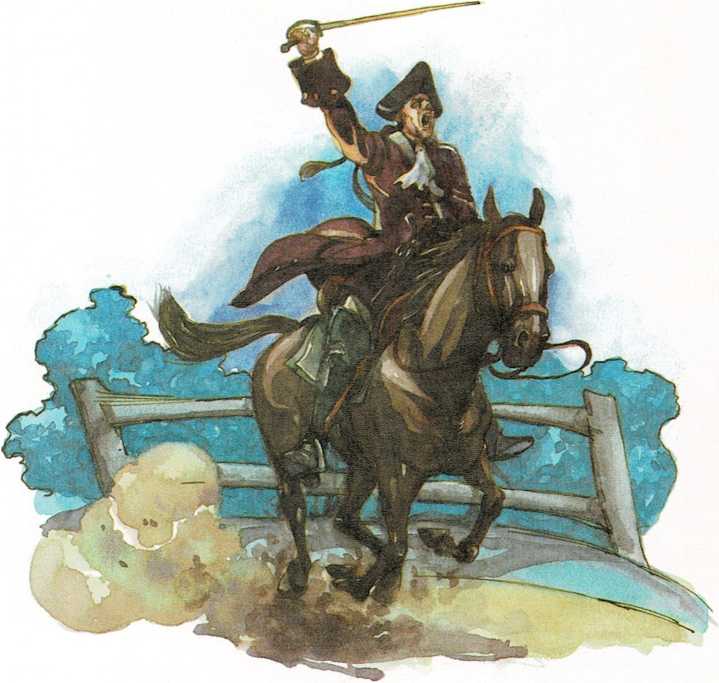
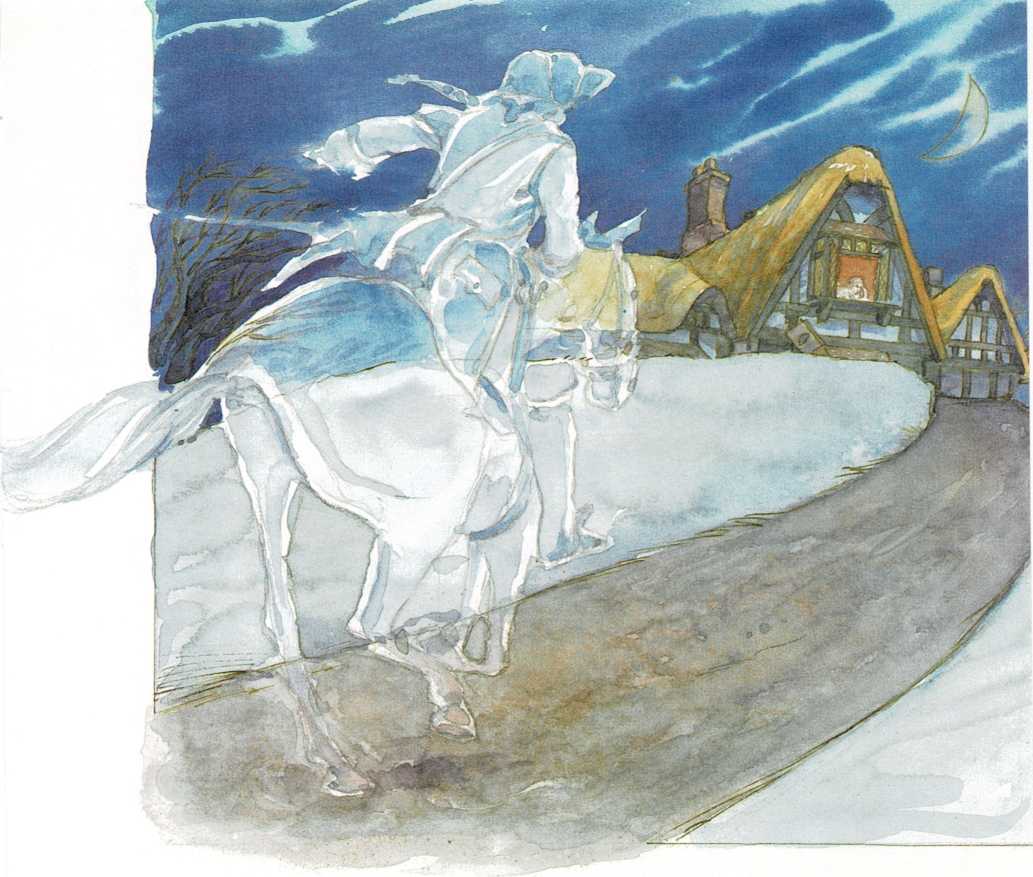
And still of a winter’s night, they say, when the wind is in the trees,
When the moon is a ghostly galleon tossed upon cloudy seas, When the
road is a ribbon of moonlight over the purple moor, A highwayman comes
riding—
Riding—riding—
A highwayman comes riding, up to the old inn-door.
Over the cobbles he clatters and clangs in the dark inn-yard;
And he taps with his whip on the shutters, but all is locked and
barred: He whistles a tune to the window, and who should be waiting
there But the landlord’s black-eyed daughter,
Bess, the landlord’s daughter,
Plaiting a dark red love-knot into her long black hair.
—
from Hills End by Ivan Southall
The Storm
Elaine Godwin, a schoolteacher in a small Australian town, has a great
interest in the rocks, plants, and creatures of the surrounding
mountains. When Adrian, one of her students, tells of finding a cave
with paintings that must have been done by Aborigines a long time ago,
she is very excited. But most of Adrian’s friends think he has just
told another of his whoppers to get out of trouble. Together, they set
off into the mountains to find the cave.
At the foot of the bluff Miss Godwin gathered her children round her.
She was guilty of deceiving them. They thought she only wanted to talk
but really she wanted to rest. She felt like a jelly inside, quivery and
without any strength. She knew now that this climb up the bluff was
every bit as bad as she had feared. This was why she hadn’t climbed it
when she had come before; it had been simply common sense, not
cowardice.
She drew her book from her haversack and it fell open at a photograph of
the rock paintings at Lightning Totem Centre in North Australia.
“. .. Now take a good look at these, Adrian, and tell me if you find any
similarities to what you saw.”
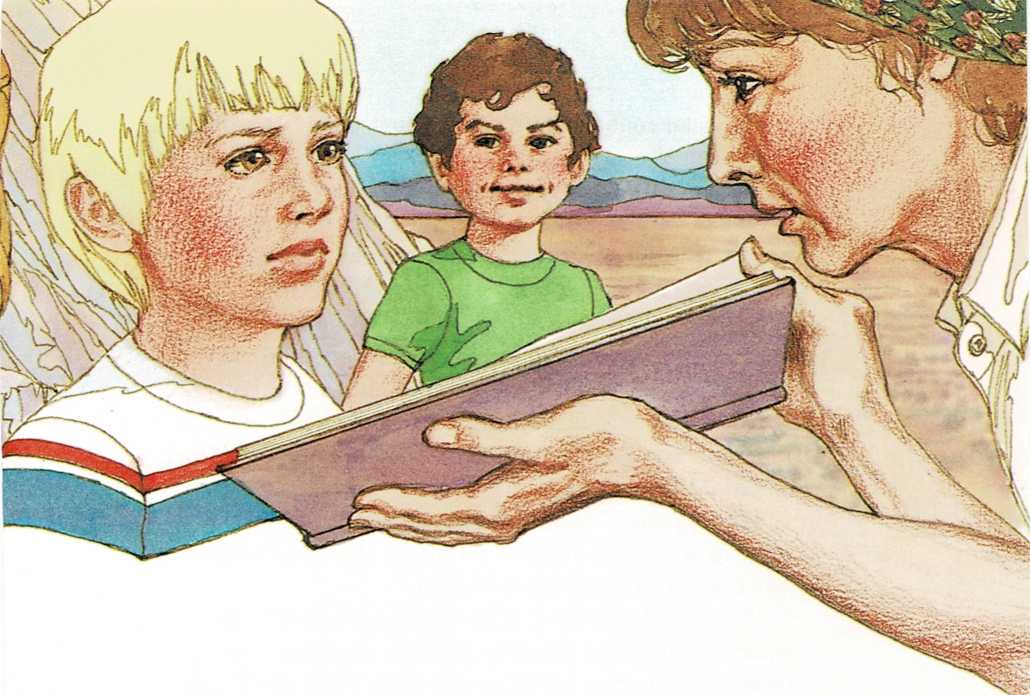
Adrian had been through this before. “No,” he said.
“You’re sure?”
“Certain, miss.”
“I’m going to ask you once more, Adrian, to go through the book from
cover to cover and make your selection. There must be similarities
somewhere.”
“I told you about the red hands, miss.”
“That doesn’t help much, Adrian. There are thousands of red hands
throughout the continent. It is their association with these other
things that is mystifying.”
Paul sighed inwardly. Of course the association was mystifying. It
wasn’t even true. But Miss Godwin had spoken about this, over and over
again. She was excited by it. She had kept harping on it, perhaps trying
to break Adrian’s story down, but Adrian’s story had never broken. He
hadn’t changed a detail. He had described things which, Miss Godwin
said, had never been found before. They must have been made a very long
time ago, perhaps thousands of years ago, by artists out of touch with
all other men.
So she waited while Adrian thumbed over the book again, from photograph
to photograph, endeavoring to steady her nerves and marshal her
strength. If she failed to make the climb what would these children
think of a teacher who taught them to explore but was afraid to explore
herself? What would they think of a teacher who enthused about the art
of the Stone Age men but was too frightened to make a personal effort to
see it?
“Really, miss,” said Adrian, closing the book and passing it back to
her, “it might be that I’ve forgotten, but I’m sure they were
different.”
“Very well, Adrian.” Miss Godwin glanced at her watch. “We’ll find out
how good an explorer you are. I think you’d better lead the way with
Paul, don’t you, and the rest of us can follow very carefully?”
“Yes, miss. There’s no danger really. It looks much worse than it is.
There’s only one thing. Don’t look down unless you’ve got something to
hang on to.”
“Do you hear that, children? Adrian says there’s no danger and Adrian
knows. But if any of you would rather stay down here just say the word.”
Gussie would have liked to have stayed, very, very much, but she was
frightened that everyone would tease her. She didn’t like the look of
the water trickling from the rocks, or the moss and the slime. And her
legs were aching, with the awful ache that she got sometimes and that
her mother called “growing pains.” It didn’t seem right that it hurt to
grow, Gussie thought, but perhaps that was why the trees groaned
sometimes. Perhaps it hurt them, too.
Maisie, too, was rather anxious, but she was frightened to speak up,
frightened that everyone would make fun of her.
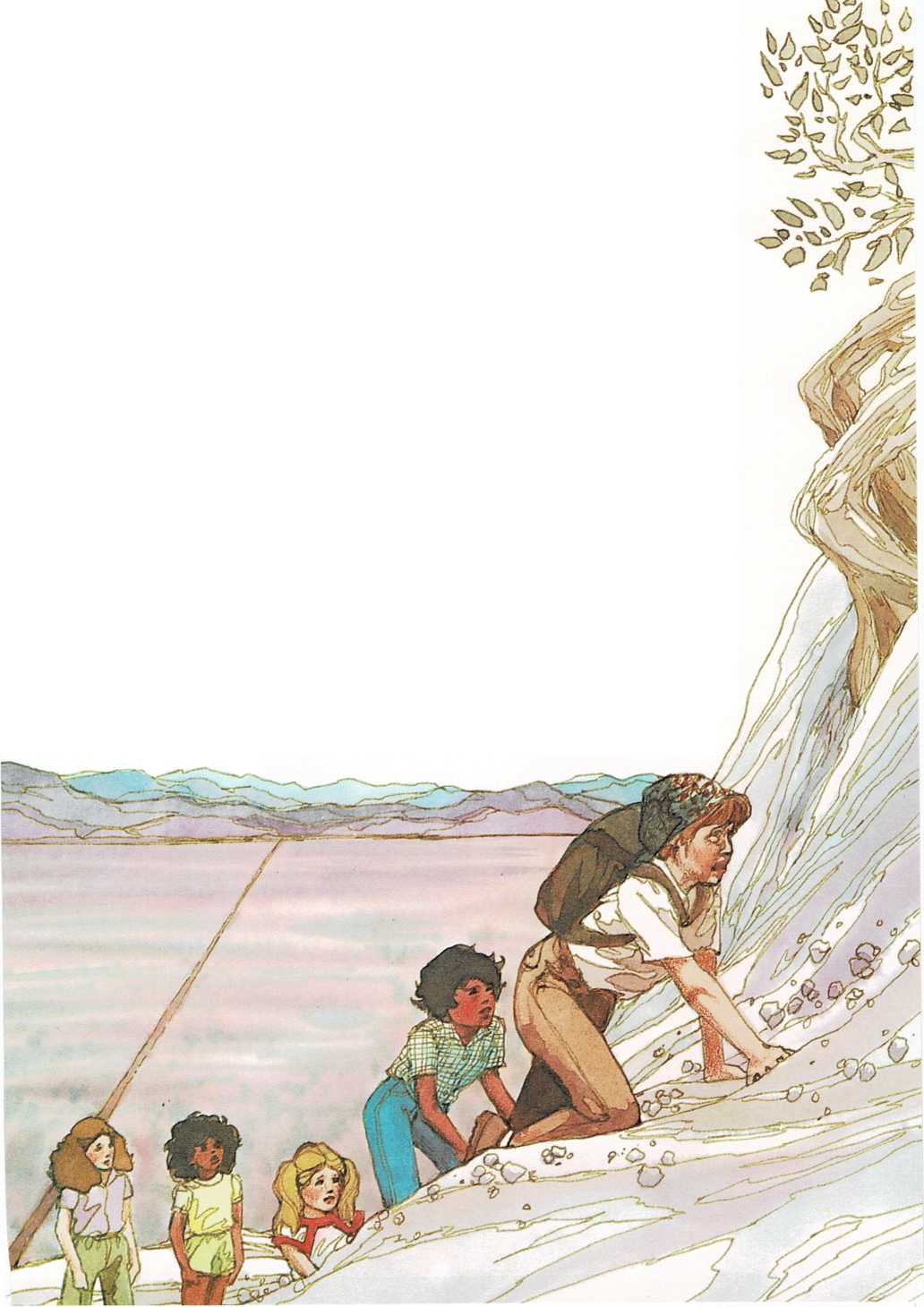
“If it is an important discovery,” she said, “will we all be famous?”
“I don’t know about that,” said Miss Godwin. “Adrian will be the famous
one. We’ll have to name the discovery after him.”
“Golly!” said Paul, shaken for the moment. “Can we do that?”
“Of course we can. It’s our right, and if the Government agrees the
caves will be known by his name for ever and ever.”
“No kiddin’?” queried Adrian.
Miss Godwin coughed discreetly. “That isn’t quite the word, Adrian, but
it is a fact. They’ll be named in your honor.” Perhaps she was rueful
then. She wasn’t selfish, but it would have been nice if they had
suggested the discovery be named after her. She couldn’t expect children
to think of that.
“Come along, then. Let’s start.”
The heat was very trying and Miss Elaine Godwin shuffled up the face of
the bluff, perspiring freely, shaking so much at the knees that she was
sure they were knocking together. Dear, dear, dear! Why couldn’t she act
her age and admit it was too much for her? She was groaning for breath
and her pulse was beating so hard in her temples that all she could hear
was its thud-thud-thud. And, bless her soul, she’d have to get down
again afterward. That would be worse by far. It was this continual
patter of little stones, and the times she slipped on wet rocks or
slime, the times she looked down because the depths drew her eyes with a
dreadful fascination, the times she groped for a foothold and sent a
shower of fragments on the children beneath her. The times she was giddy
and her head swam, the times she wanted to scream at the top of her
voice, yet had to say so calmly, “Come along, children.”
Suddenly she was there, on the wide ledge that formed the opening to a
cave, and Paul was smiling at her and Adrian seemed unusually subdued.
“Well, well, well,” she said breathlessly. “Here we are.”
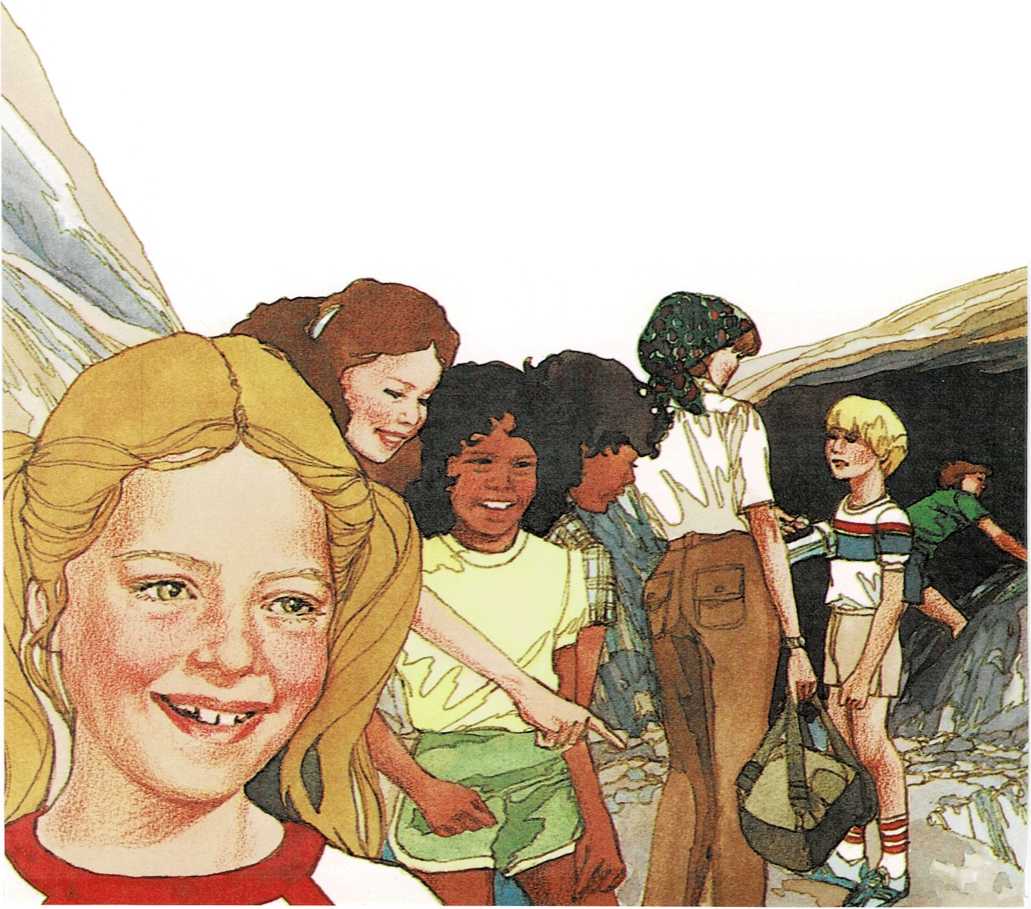
Harvey, Gussie, Maisie, and finally Frances came up on the ledge behind
her. The girls were flushed and excited, full of their achievement
because not too many girls had got as far as this before. They had been
surprised to discover that the way up was far less dangerous than they
had been told. Of course, they had had to be careful, but no more
careful than in climbing a tree.
Miss Godwin was still fluttery and was finding it difficult to conceal
her distress. All she wanted to do was sit down, and she never knew how
she resisted the yearning. She was a brave soul and a far better leader
than she gave herself credit for. They never dreamed that she was
frightened, never imagined the state of her mind.
“Now, Adrian,” she said, “we’re in your hands.” “Have you brought a
torch, Miss Godwin?” “Of course. Of course. Always prepared.”
Miss Godwin’s torch was an electric lantern, six volts, and its power
would last for days.
“Is it very far in, Adrian?”
“No miss. So long as we find the right cave it’s only a few yards.”
“Goodness!” Miss Godwin was rather stern. “You have no doubt that you
can find it?”
“Oh, no. It might take a little time, but I’ll find it.”
“Very well. As I said, we’re in your hands. Take the torch. We don’t
know how soon we’ll need it. The sunlight won’t last for ever.”
It was Gussie who was left behind. She was so enthralled by the great
rock bed lying beneath her that these silly caves pitting the face of
the bluff seemed unimportant. She had climbed high, right up here, and
the view was the reward, the depth of space, the impression that she was
sitting in an airplane looking over the side. She simply didn’t notice
the sky until suddenly there were no shadows.
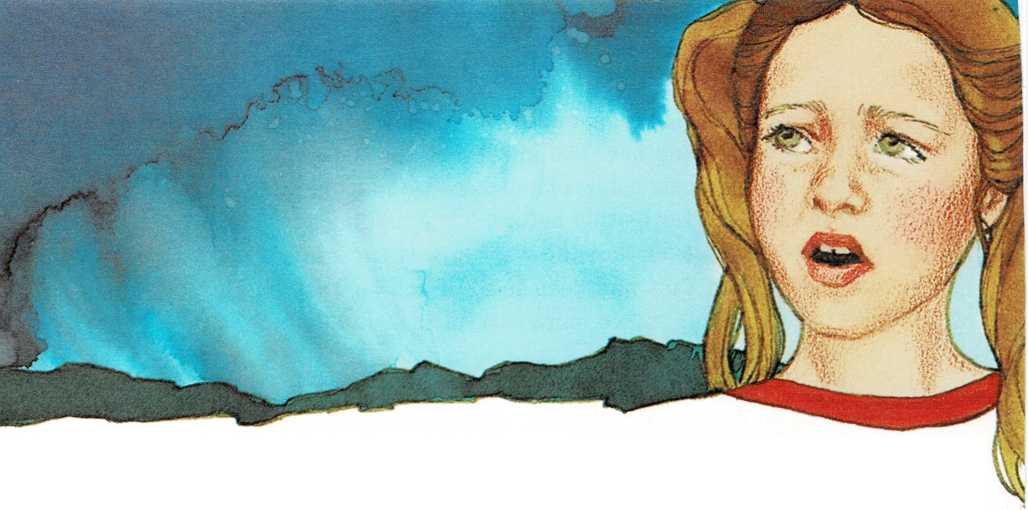
She glanced up and the sun had vanished behind the strangest looking
cloud she had ever seen. It seemed to have reached out of the north like
a big black arm and closed its hand round the sun.
“Ooh,” she said. “Look at that.”
She turned, and there was no one to look. They’d all gone.
“Oh, brother!” she said. “Wait for me. Wait for me!” “Goodness!”
exclaimed Miss Elaine Godwin. “What was that?”
She knew what it was, really, but she was so accustomed to putting
questions to children that she felt obliged to ask.
“That was thunder,” said Frances.
“Thunder, indeed. I hope we’re all not going to get wet on the way
home.”
She wasn’t thinking that at all. Her only thought was her fear of
descending the bluff. If rain came with the thunder the footholds would
be like glass, and somehow she was sure it was raining; although these
caves were warm there was in the air the touch and smell of water or
ice.
“Children,” she said, “I think we’d better go back to the entrance to
see what’s happening.”
“I’ll go, miss,” said Paul. “I know my way. I’ll only be half a minute.”
“Thank you all the same, Paul, but we must keep
together. We have only the one torch, and I don’t wish to be left in the
dark, nor do I wish you to be stumbling alone in the dark. Lead the way,
Adrian.”
“Fancy a storm on a day like this!” said Gussie. “Ooh!”
“Yes, Augusta?” said Miss Godwin. “What did you mean by that tone of
surprise?”
“I must have seen it coming. I saw a cloud. The funniest cloud you ever
saw.”
Miss Godwin shivered. “What was funny about it, Augusta?”
“It was like a big black arm, reaching across the sky, taking hold of
the sun.”
“You should have told me, child.” Her voice was so sharp that they were
surprised. “Hurry on, Adrian. If there’s to be a storm we must get out
of here.”
They followed the beam of the torch, this way and that way, but Miss
Godwin was bustling so busily on Adrian’s heels that she confused him
and he took the wrong turning. He wasn’t certain in his mind that he was
wrong, but the doubt was there, and Paul said, “Not this way, Adrian.”
“We’ll leave that to Adrian, shall we?” snapped Miss Godwin.
“But he might be right, miss,” stammered Adrian.
“I—I think he is right.”
“Nonsense. I distinctly remember this chamber.
Hurry on.”
But Adrian knew he didn’t remember it, not from any of his journeys in
here, and when the pale whiteness of old bones moved into the beam of
the torch he was certain he’d never set foot in this cave before.
He heard the sharp intake of Miss Godwin’s breath close to his ear,
heard the squeal from Harvey and the gasp from Paul.
“Wait!”
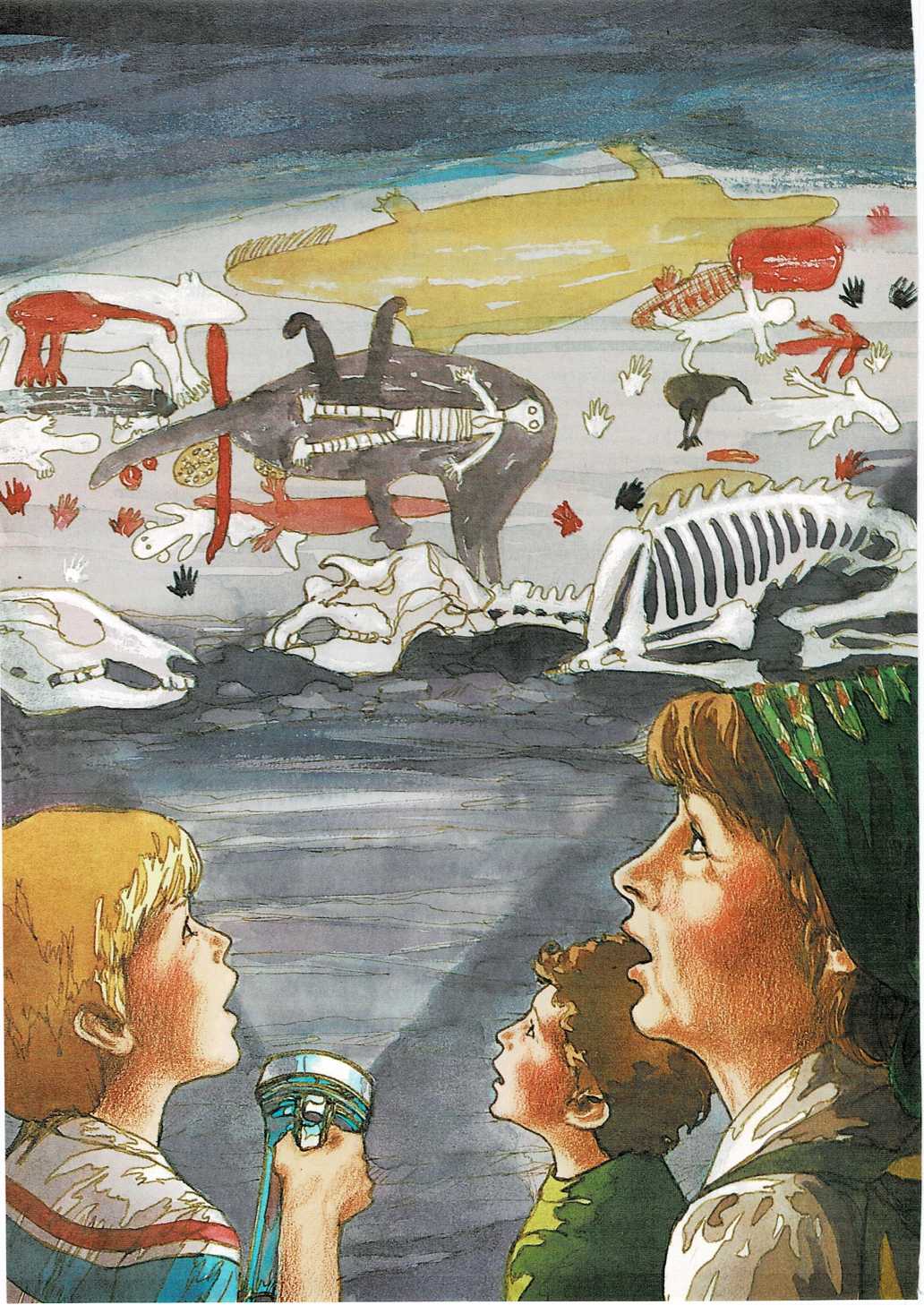
Miss Godwin took the torch from Adrian and directed it across the floor
of the cave to a ledge. There were many bones, huge bones, and kangaroo
skulls twice as large as any they had ever seen, and on the walls beyond
were red hands and black hands and white hands and drawings of animals
and devil men.
Miss Godwin sighed, a deep, shuddering sigh, and Gussie cried out, and
Paul was so ashamed he wished the ground would open up and swallow him.
Adrian was panting in wonderment, in amazement, in absolute elation.
They were here. The drawings were here. And they’d called him a liar.
That prim and proper Paul had called him a liar and he wasn’t a liar at
all.
“I’m sorry, Adrian,” Paul murmured. “Golly, I am sorry!”
Frances, strangely, was a little saddened. She had believed Adrian yet
she was sorry that Paul had been proved wrong—and Gussie was all
confused. She had been so sure that Adrian had been lying. So very, very
sure, because Paul had been so sure.
Suddenly all were talking at once, and Miss Godwin had to raise her
voice to a shout. “Be quiet!”
She waited a few moments. “That’s better. That’s very much better. Now,
no one is to touch a single thing. Before we make any examination I want
to photograph everything just as we find it…. Adrian, this is a most
wonderful, wonderful discovery. My only regret is that I didn’t come a
week ago. Imagine it, children—Hills End will be famous. We’ll have
anthropologists coming here. Great scholars from all over the world.
Children, children, this is the most wonderful thing that has ever
happened to us. Oh dear, I—I’m really so excited. I’m all of a
flutter. Adrian, my boy.” She thrust her arm round him and hugged him
tight. “Why didn’t you tell us about the bones, too? Didn’t you think
they were important? They’re the bones of the giant kangaroo—and the
diprotodon, I think. Adrian, Adrian, these animals have been extinct for
tens of thousands—perhaps hundreds of thousands—of years….
Goodness me, I’m all of a flutter! I—I cannot believe my eyes. I’m
going to wake up in a minute. Oh dear, dear, dear!”
“You won’t wake up, Miss Godwin,” said Paul. “It’s real. Really and
truly real.”
She sighed again, a shivering and breathless sigh. “Take the torch,
Paul. Shine it on my haversack. I—I must get my things.”
She was trembling so much she could hardly undo the straps and she took
out her camera and her tripod and her flashlight fittings, and suddenly
heard the thunderclaps again and felt the cold air that was rapidly
expelling the warmth from the caves.
She looked up with a troubled frown and slowly stood erect, leaving her
precious equipment at her feet. “First of all,” she said, “I think we’d
better take a look at the weather. We mustn’t lose our sense of
proportion. These drawings will be here tomorrow—next week—they’ll
remain. We must take a look at the weather.”
“Now, miss?”
“Certainly, Adrian. But we must make sure that we don’t lose our cave.
It took a long while to find it, even though you were sure you knew
where it was. Now, what shall we do?”
“I’ll go, miss” said Paul. “I said before it would be all right.”
“No. We stay together. While you’re with me you’re my responsibility.
There had been no warning of a storm. This was some trick of the
weather. Some local disturbance…. “Now what shall we do? Of course,
what we want is a ball of string. That’s it. A ball of string. Always be
prepared, children. That’s the division between the foolish and the
wise.”
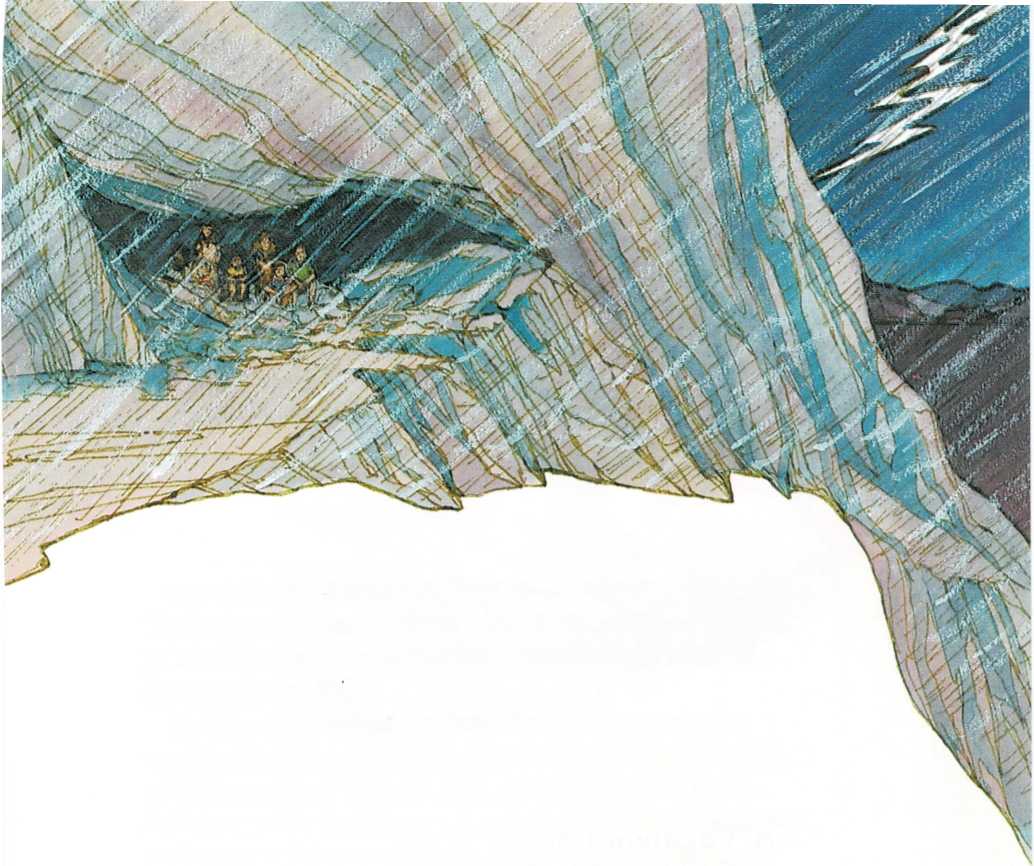
She took the ball of string from her haversack, tied the loose end
round a heavy stone, and directed Paul to proceed in front with the
torch while she paid out the string behind her.So they came again toward the opening, toward a world of frightening
sound and vivid lightning flashes, of bitter cold, of violent wind, of
torrential rain and hailstones. The hailstones struck the ledge and
bounced and were as big as golf balls. They couldn’t approachthe opening. They had to stop well back, clear of showering ice and
wind-driven rain. The world beyond
was like a block of frosted glass—water, ice, and wind in a mass
through which they could not see.
The tremendous storm that sweeps over the mountains creates havoc. The
children, separated from their teacher, manage to get back to the town
of Hills End only to find it flooded and deserted. They are on their own
in a struggle to survive. Ivan Southall, the author of Hills End, is
one of Australia’s best writers of children’s books. Another of his
stories you might like is Ash Road, which is about a group of children
caught in the path of a devastating fire.

